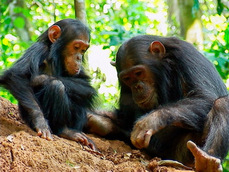 Imitation is the sincerest form of flattery. Is an adage uttered by countless parents during escalating sibling tempers that, as it turns out, isn't just another platitude. Imitation is, quite simply, the very fundamental basis for all learning. I find it interesting that in our society mimicry is often an anger prompting activity. I presume it is directly connected to our culturally induced national fixation on cheating and the associated feelings of unfairness. I would like to counter that idea with a bit of anthropological and anecdotal evidence. Copying behaviors, movements, and actions is the way all primates learn. In Anthropology, culture is defined, quite simply, as learned behavior. The great Jane Goodall was the first person to understand that other animals, besides humans, create and use tools, and that they have a developed culture. They learn to survive by watching and copying. The documentary, Wild Chimpanzees, which highlights a scene of a chimpanzee mother (Flo) teaching her young daughter to fish for termites is quite possibly one of my favorite films of all time. The young chimp sits and stares at her mother for a very long time. She eventually gets a blade of grass and shapes it with her teeth, just like her mother did. Then she lies on her side over an entrance hole to the termite mound leaning on one arm and holding the grass fishing pole in the other. She pokes the vegetation into the hole, and then she pulls it back out covered with squirming insects. She tries to drag the grass over her wrist and through her lips the way her mother so adeptly delivers the crunchy snack to her own pursed lips, but the termites fall off before they reach her mouth. She continues to practice and eventually manages to get a few tasty morsels before her mother moves on to the next lesson. Every time I watch this fascinating evidence of primate learning in action, I recognize the obvious delight that young chimp experiences when she is rewarded with her well deserved snack. How does this tale relate to kids? Children, to the consternation of older siblings, are little copy cat machines. They watch, they imitate, and they experiment, constantly. Everything they have learned over their entire lifetime has been the result of imitating behaviors. As a teacher/facilitator, I often find myself debating whether certain mediums are appropriate for children to use as learning tools. For example, this past week several kids decided they would like to watch America's Got Talent or some such competitive television show. I wasn't entirely clear why these kids were so attracted to this show, besides the entertainment value (one contestant on the show was a very young girl who sang - screamed like Ozzy Osborne). Later that evening two of the girls went home and proceeded to write a song. They came in the next day wearing fancy dresses and secretive smiles. They spent a few hours typing their song and then set up a stage and seating for the audience, made tickets and cardboard microphones, and proceeded with some giggling and miss starts, to perform their song. It was amazing! Why do I even spend the energy questioning, when the results are so clear, every single time? No, these girls probably won't become pop stars or famous lyricists (although one is determined to have her own YouTube channel and become a household name that way), however, they are creating experiences and developing interests, through imitation, that will provide amazing memories and learned skills they will carry with them for the remainder of their lives. This in a nutshell is self-directed learning! All Deep Root Center provided was the resources, support, and the space for mimicry that allowed these girls to shine.
0 Comments
Your comment will be posted after it is approved.
Leave a Reply. |
|
© 2024 Whole Learners, Inc. 501(c)3
Deep Root Center
48 Riverside Drive, Canton, NY 13617
315*323*1435/[email protected]
Deep Root Center
48 Riverside Drive, Canton, NY 13617
315*323*1435/[email protected]


